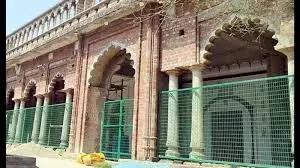
Controversy erupts over Janeta Dargah land as probe begins under new Waqf Law
text_fieldsLucknow: A significant dispute has arisen in the Sambhal district of Uttar Pradesh over the ownership of land associated with the historic Janeta Dargah.
According to reports, an inquiry has been launched under the revised Waqf law, though no definitive conclusions have been drawn yet. Local authorities have reportedly started identifying the land as government property, a stance that has been met with strong resistance from residents in the area.
The Janeta Dargah, situated in Janeta village within the Chandausi tehsil, is believed to be approximately 250 years old and is considered to hold considerable religious and cultural value.
It is widely believed that a respected Sufi saint known as Dada Miyan once resided there and was later buried at the site. Since then, an annual urs has traditionally been held in his honour. However, sources indicate that for the first time in recent memory, the local administration did not allow the event to take place in 2024, India Tomorrow reported.
Sources suggest that the controversy initially surfaced when certain locals, reportedly motivated by the potential earnings from the urs, tried to assert control over the fair’s revenue.
A local resident, Mohammad Javed, is said to have written to the Chief Minister of Uttar Pradesh, asserting that the land in question is government property.
In response to the complaint, the Chief Minister is reported to have instructed the District Magistrate of Sambhal to look into the issue. The investigation was then handed over to Sub-Divisional Magistrate Nidhi Patel.
Accompanied by Tehsildar Dhirendra Pratap Singh and a Revenue Department team, Patel visited the Dargah five days ago for a preliminary review. A follow-up visit was conducted on April 15, 2025, during which the team carried out land measurements and a more thorough examination.
Tehsildar Dhirendra Pratap Singh reportedly stated that while revenue records list the land under the name of the dargah, it is still being treated as government-owned.
This contradictory position has sparked significant concern. Critics are questioning how the land can be officially registered to the dargah yet still be categorized as government property.
Concerns are also being raised about the fairness of the investigation, with some alleging that local authorities may be under political pressure to classify the land as government-owned.
Further accusations have emerged claiming that officials are attempting to depict the dargah as lacking a designated mutawalli, despite Dr Syed Shahid Miyan, a resident of the area, being recognized as the official caretaker. It was Dr. Miyan who submitted the necessary documentation to the investigating authorities.
Locals suspect that the narrative suggesting there is no official mutawalli is part of a deliberate attempt by the administration to take control of the dargah's land. Religious leader Maulana Afzal Miyan from Janeta Dargah has strongly criticized the actions of the Sub-Divisional Magistrate, arguing that any investigation should be conducted through proper channels and not carried out publicly without advance notice.
Maulana Afzal Miyan also highlighted the dargah's role in supporting the underprivileged, mentioning that it runs a community kitchen and provides free education to orphans through an English-medium school. He stressed that the property is being used for charitable purposes, with the management often spending additional resources to sustain these services.
Meanwhile, accusations have surfaced against Dr. Shahid Miyan, alleging that he is unlawfully occupying the position of mutawalli and has accumulated wealth through it. However, his supporters have rejected these claims, asserting that the real motive behind such allegations is the desire to acquire the valuable dargah land for personal benefit.
The inquiry into the Janeta Dargah is reportedly the first such case initiated under the newly amended Waqf Act in Uttar Pradesh, prompting growing concern among the Muslim community and opposition leaders. They argue that the apprehensions voiced during the passage of the Waqf Amendment Bill—particularly fears that the government might appropriate waqf properties—are now coming true.
The final findings of the investigation are expected to be submitted to the District Magistrate, who will take the final call. However, Tehsildar Dhirendra Pratap Singh’s preliminary assertion that the land belongs to the government has already triggered political and communal tensions in the area.
As the situation unfolds, it is raising serious doubts about the neutrality of the local administration and the state government, casting suspicion on how religious property matters are being handled in Uttar Pradesh.












